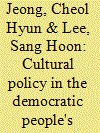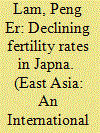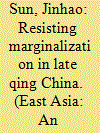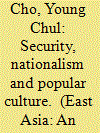|
|
|
Sort Order |
|
|
|
Items / Page
|
|
|
|
|
|
|
| Srl | Item |
| 1 |
ID:
092611


|
|
|
|
|
| Publication |
2009.
|
| Summary/Abstract |
The purpose of this paper is to introduce North Korean culture as well as its foundation, North Korean cultural policy. The paper consists of three broad sections. First, I explore the unique qualities and changes of North Korean cultural policy. Next, I look into what North Korea considers to be culture and how it is portrayed. Finally, I will analyze the similarities and differences between North and South Korean cultural policy, and the possibility of their convergence.
|
|
|
|
|
|
|
|
|
|
|
|
|
|
|
|
| 2 |
ID:
092609


|
|
|
|
|
| Publication |
2009.
|
| Summary/Abstract |
The two key impediments to addressing the ageing crisis of Japan are: electoral politics which avoid making hard decisions painful to voters (especially the hiking of the consumption tax), and even more insidious, the norms of Japanese corporations and patriarchal society which discourage women from marrying and producing babies while holding onto a career and aspirations of their own. If Japan's ageing problem were to persist in the long run, then a concomitant decline in its manufacturing capacity (which underpins its export-dependent economy) and a diminution of its political weight in its international affairs can be anticipated.
|
|
|
|
|
|
|
|
|
|
|
|
|
|
|
|
| 3 |
ID:
092610


|
|
|
|
|
| Publication |
2009.
|
| Summary/Abstract |
From the mid-19th century, China began to experience drastic changes such as bureaucratic corruption, popular insurgence, the waning of the central imperial power, and the decay of the Grand Canal, which had been the lifeline for the whole empire during the late imperial period. The abolition of grain tribute shipping, the withdrawal of the canal and canal-related hydraulic system, and then the disruption of the canal channel in the north resulted in the decline of most urban centers along the canal's course, including Jining, a great canal metropolis in southwestern Shandong province. Furthermore, the overwhelming intrusion of Western capitalist-dominated globalization dramatically turned these interior urban centers into hinterlands. Jining found itself downgraded to a peripheral status but did not decline like most northern cities and areas. This paper examines the extraordinary undertakings by Jining's powerful and open-minded elites who largely constrained the locality's decline and vigorously worked towards its modernization in the last decades of the Qing. This local story illustrates an example of a partially successful Western urban transformation in inland China
|
|
|
|
|
|
|
|
|
|
|
|
|
|
|
|
| 4 |
ID:
092617


|
|
|
|
|
| Publication |
2009.
|
| Summary/Abstract |
By examining the cultural representations of the South Korean notion of the Self/Other in relation to its major traditional enemy - North Korea - this article aims to capture a picture of South Korea's discursive economy of the North, and to problematise the South Korean identities implicated in that economy in the early 2000s. To achieve these aims, this article focuses on representations of a successful popular South Korean film which was released in 2000, just a few months after the first inter-Korean summit: Joint Security Area JSA. By analytically reading JSA, it is revealed that, in South Korea, the traditional discursive practices based on the Cold War thinking have been eroded. For the South, the North is part of the Self (Korean-ness; love for the North as the same nation) and, at the same time, is an Other (South Korean-ness; contempt for the North as an inferior state). Related to this, South Korea appears to be the uneasy Self without a firm Other in between Korean-ness and South Korean-ness.
|
|
|
|
|
|
|
|
|
|
|
|
|
|
|
|
|
|
|
|
|